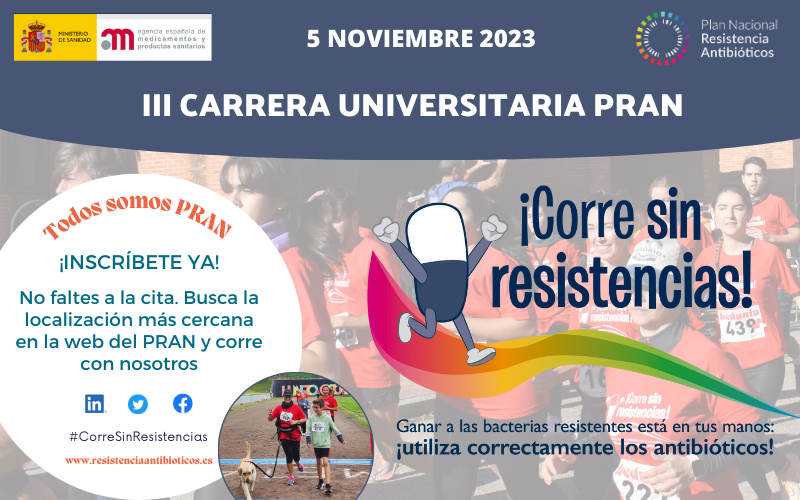This November, the PRAN brings to the streets the third edition of “Run without resistance!” on the occasion of World Antimicrobial Awareness Week. This sports initiative continues the work to raise awareness about the problem of resistance by involving Spanish universities as a key group in improving the use of antibiotics.

After months of organization by the Complutense University of Madrid, the University of Córdoba, Murcia, the Basque Country, Salamanca, Seville and Valencia, the registration period for the different races is now open, which this year will take place in 7 cities .
- October 26: Murcia
- November 5: Salamanca, Seville, Valencia and Vitoria-Gasteiz
- November 11: Madrid
It is better prevent
Among the factors that accelerate the process of resistance to antibiotics, not only the misuse of these drugs stands out, but also the deficiencies in infection prevention and control. We can all take measures to reduce the impact of this phenomenon and limit its spread.
To this end, the World Health Organization (WHO) recommends:
- Wash hands frequently
- practice good food hygiene
- avoid direct contact with sick people
- punctually comply with the vaccination schedule
If you are a healthcare worker or pharmacist, you can help prevent infections:
- ensuring that hands, instruments and surroundings are properly clean
keeping your patients’ vaccination schedules up to date
in case of suspicion of bacterial infection, performing the relevant cultures and tests - prescribing and dispensing antibiotics only when truly necessary
- prescribing and dispensing the indicated antibiotic, with the correct dosage and corresponding duration
If you work in the agricultural sector you can contribute:
- ensuring that antibiotics administered to animals – including companion animals and those intended for food production – are only used for the treatment of infectious diseases and always under veterinary supervision
- vaccinating animals to reduce the need for antibiotics and devising alternative methods for use in plant production
- promoting and applying good practices in all stages of food production and processing, both of animal and plant origin
- adopting sustainable systems with improved levels of hygiene, biosecurity and stress-free animal management
- applying international standards for the responsible use of antibiotics, established by the OIE, FAO and WHO
















